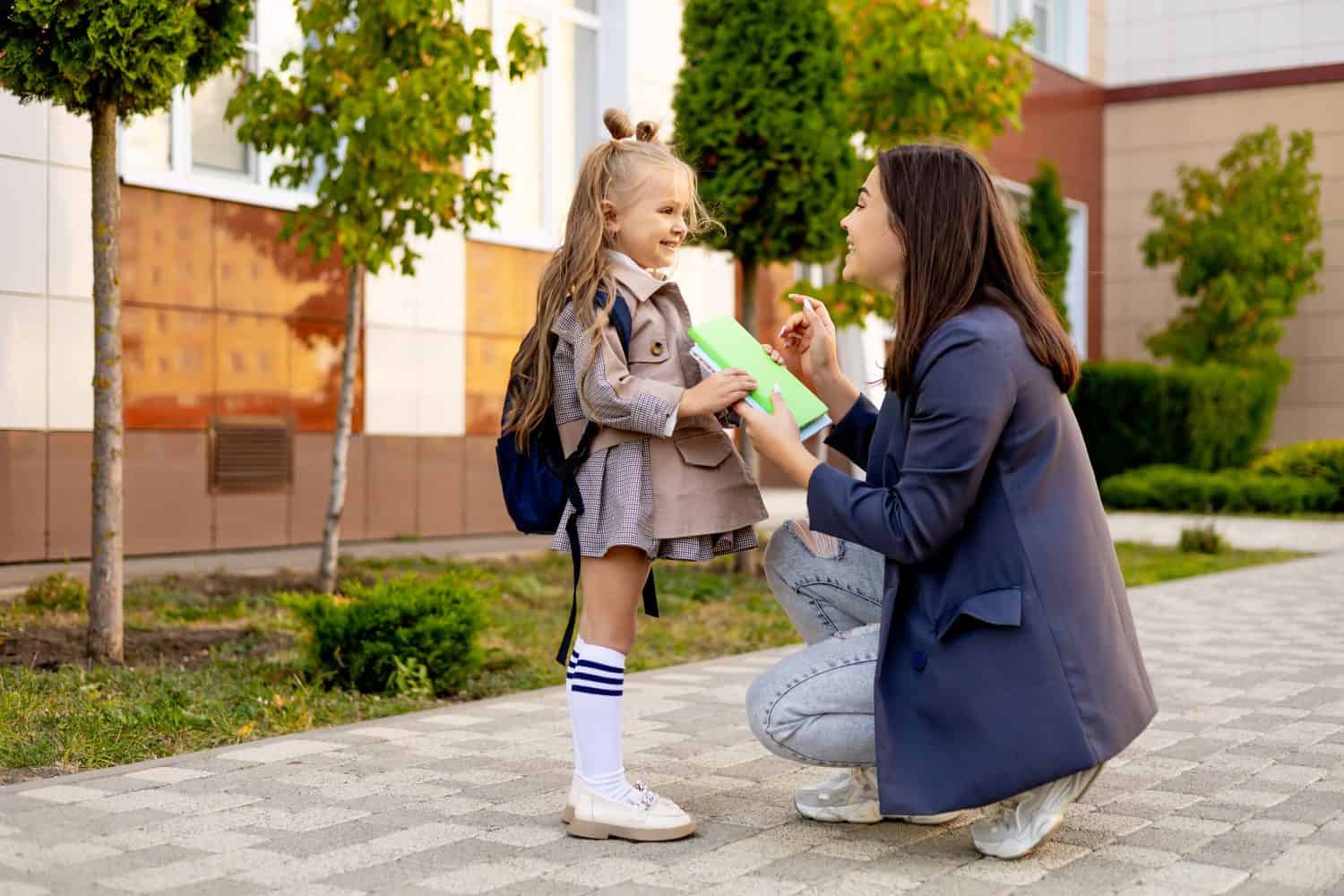Parents have to make what feels like millions of decisions for their children throughout their lives, some more important than others. One of the biggest? Where your child will go to school. Maybe you have a kid who is about to start pre-K or kindergarten. Or maybe your child has already been in school, and you want to switch up their learning environment. Either way, it can feel overwhelming. How do you know what to do and how to make the best decision for your family?
Every child and family situation is different, but there are still some basic questions every parent should ask themselves before deciding on a school for their kids. We talked to early childhood education experts who shared details about the different educational options available and what to look for when deciding what option is right for your child. As parents, we all want what’s best for our kids, but sometimes we need a little help figuring out what that is!
Two Considerations When Choosing a School

Every kid is different, and the type of school they will thrive in is different too.
©Rido/Shutterstock.com
Elizabeth Fraley, M.Ed, founder of Kinder Ready, suggests that parents focus on logistics and values when it comes to choosing a potential school for kids. “Think about where you are located, your everyday routine,” Dr. Fraley tells Moms Who Think. “You are going to be driving to that school every day, so location is key.”
Secondly, ask yourself what type of values your family prioritizes. “Are you more of a traditional or progressive family? Do you want to follow a strict curriculum or focus on individual interests?” Dr. Fraley asks. “Through touring, you will learn more about how they align with your values.”
Make a Pros & Cons List
There are so many different schooling options available, from public to private school, homeschooling to Montessori school. Each one has different benefits and things to think about for your kid. “There are pros and cons for every type of school, and ultimately the decision is all personal preference,” Dr. Fraley explains.
“With public schools, your tax dollars are paying for your child's education, but the class sizes are larger,” she says. “With private schools, they are very costly, but there is a better student-to-teacher ratio. Homeschool offers a more personalized approach to learning but lacks some social interaction that comes with another type of school. Montessori has more of an age-appropriate approach but only is offered from preschool to sixth grade.”
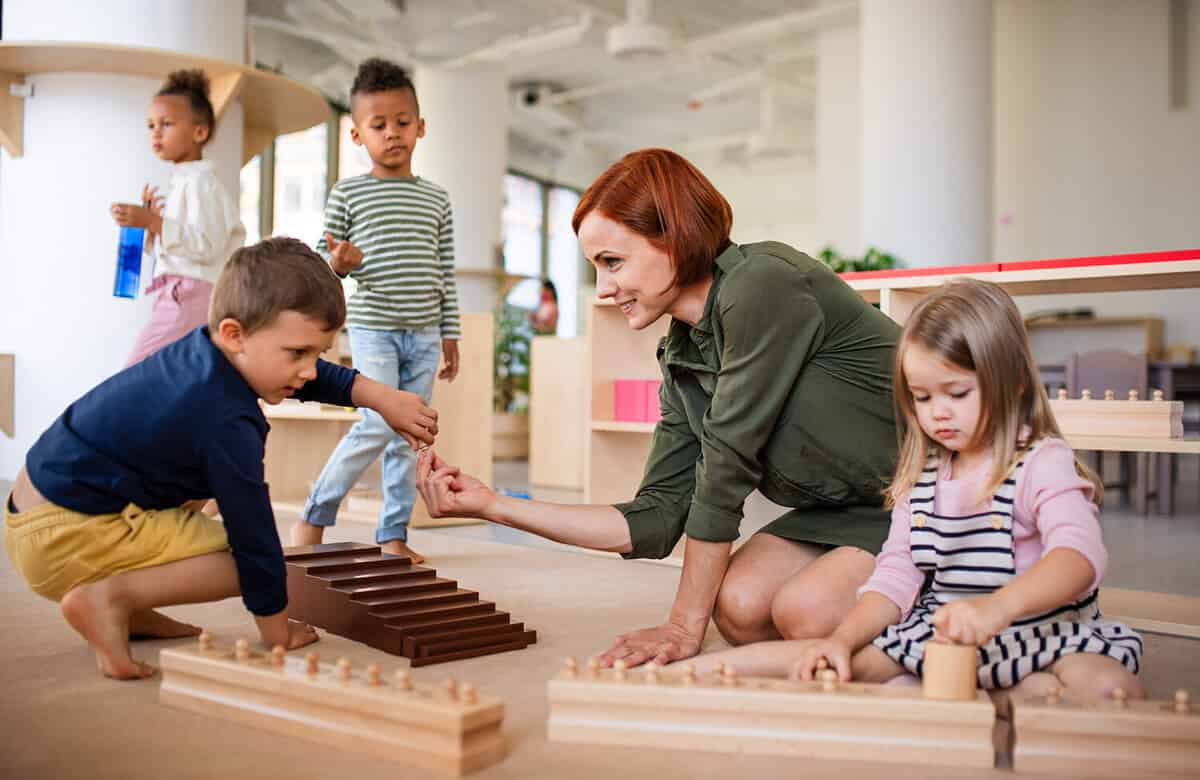
A Montessori school can foster independence in young children.
©Ground Picture/Shutterstock.com
Hayley Spira-Bauer, Chief Operating Officer and Chief Academic Officer at Fullmind, offers more insight into the different schooling options. “Public schools tend to offer greater access to extracurriculars and community services, though some families feel lost in larger class sizes,” she tells Moms Who Think.
Ultimately, your school choice should be based on your family’s goals and, as your children grow older, reflect their own interests and passions.
Monica White, CEO and founder at Elevate Academy, and co-author of the book Spark Brilliance for Educators
Evaluate Your Child’s Best Learning Style
It’s important to evaluate your child’s personality and learning style when choosing a school. “Assess your child’s daily rhythms, natural curiosities, and learning style, for not every setting works for every learner,” Spira-Bauer says.

If your kid is interested in the outdoors, a forest school might be the perfect option for them.
©Evgeny Atamanenko/Shutterstock.com
There are even more alternative schooling methods, including micro-schools or forest schools, with small and/or nature-based learning environments that focus on developing social-emotional skills. Spira-Bauer recalls a parent who chose a forest school because their child loved being outdoors and spending time in nature. “[This is] an example of how an offbeat choice can be the right fit when you understand your child’s passions,” she shares.
Involve Your Kids
Monica White, CEO and founder at Elevate Academy, and co-author of the book Spark Brilliance for Educators, suggests involving your kids in this important decision. “Every educational option has its merits,” she says. “The key is to remain clear about your family’s goals.”
If your child is about to start kindergarten, you can help them realize their goals, and when they are older, they can be more involved in the decision-making so that they develop agency over their education and lives. “Ultimately, your school choice should be based on your family’s goals and, as your children grow older, reflect their own interests and passions,” White adds.
What Type of Kids Thrive in Different School Environments?
Every kid is different, but there are still some general personality traits that can point to how well your child might thrive in a different school environment.
Traditional Public School

A traditional public school has structure and may have different opportunities that other schools don't have.
©ESB Professional/Shutterstock.com
“Kids who have a desire for structure, or easily conform to the social norms, may thrive in a traditional public or private school environment, with consistent routines and lots of group activities,” Spira-Bauer says.
White says that public school is great for kids who are adaptable and enjoy social diversity, as they offer opportunities to explore various interests. Public schools often offer a broader array of opportunities, such as various clubs, sports, advanced classes, and extracurricular activities, that your kids will love.
Private School or Charter School
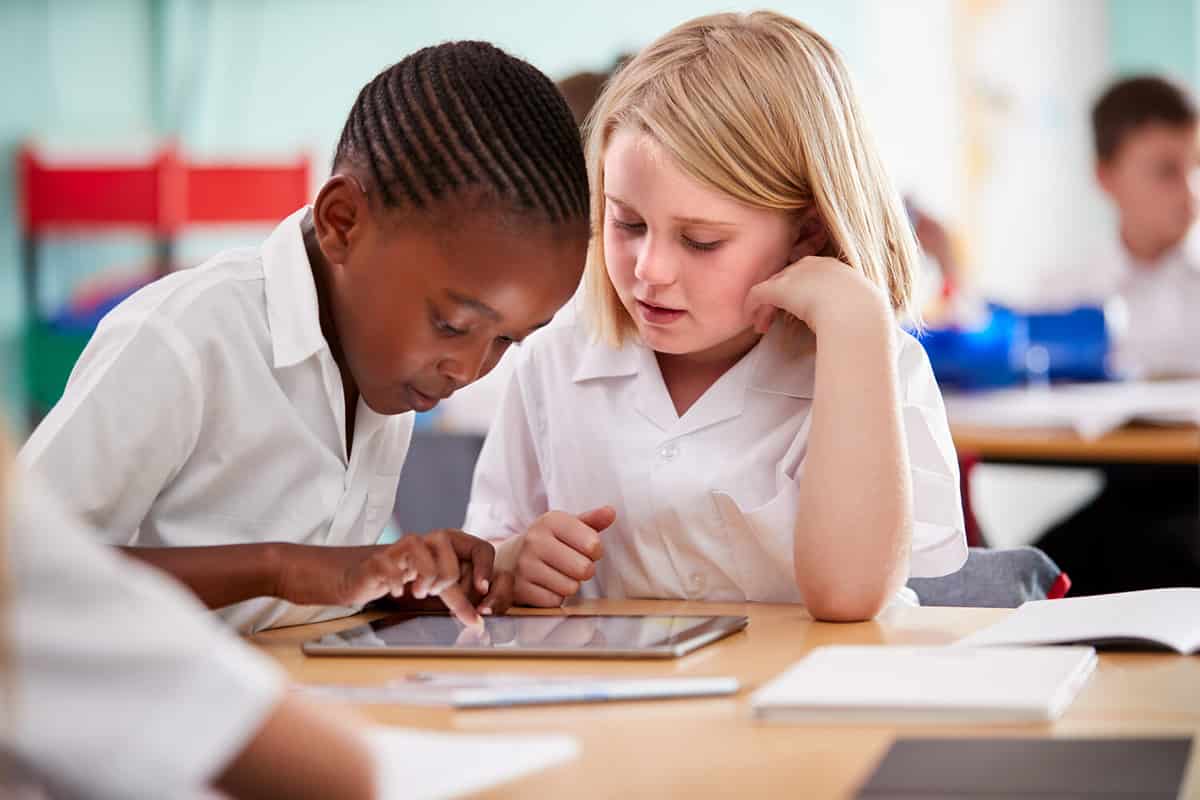
Private schools are a great choice for parents who want to lean in on a specific academic focus.
©Monkey Business Images/Shutterstock.com
Dr. Fraley prefers a private school for children who are gifted or extra passionate about learning. “Private schools are focused on high academics and are more structured. Children who have more mental endurance would be most likely to thrive in a private school.”
Not to mention, private schools typically have smaller class sizes (and therefore more individualized attention) than public schools.
Charter schools are often focused on a certain educational aspect, such as STEM, the arts, or college prep, and work best for children with a clear interest or aptitude in that area, says White. “Kids who thrive in innovative, flexible learning environments and enjoy a focused curriculum may excel here.”
Montessori or Waldorf School
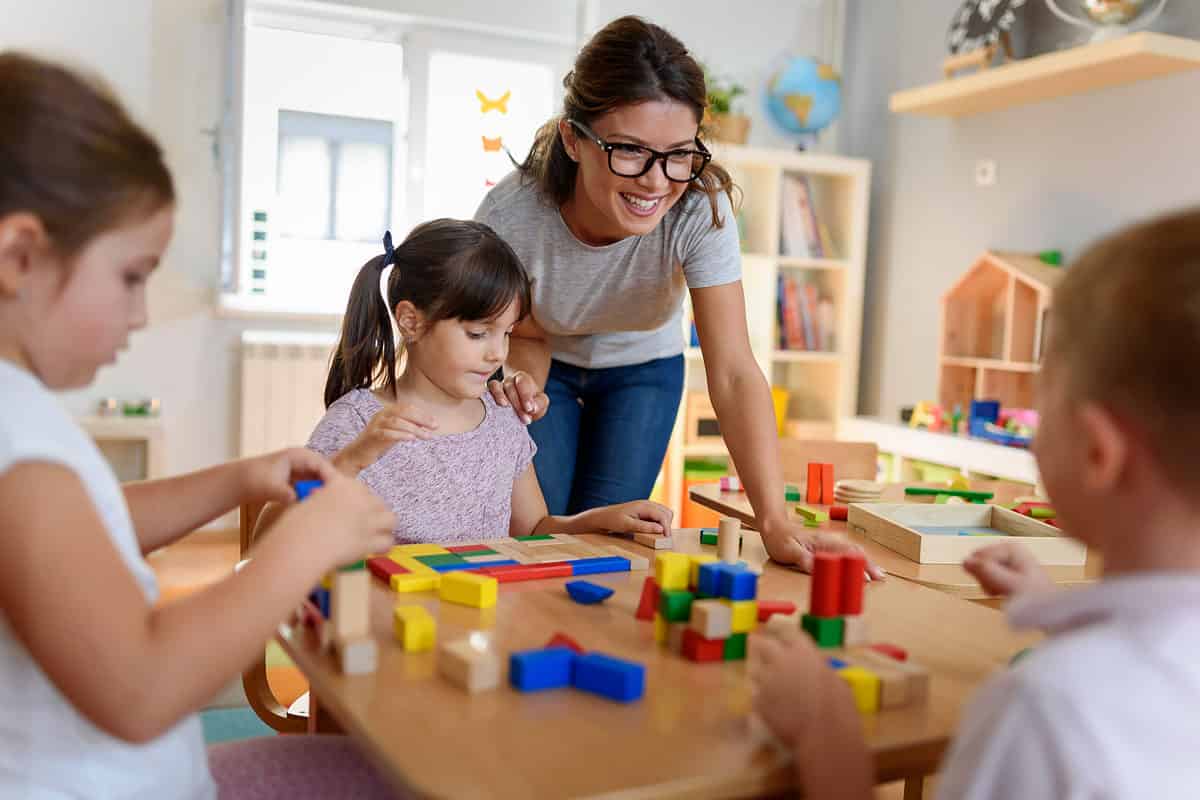
A Montessori school focuses on hands-on learning and encouraging kids to figure out problems themselves.
©Lordn/Shutterstock.com
“Montessori programs emphasize self-directed, hands-on learning,” White explains, adding that children who are naturally curious, independent, and motivated by exploring their interests at their own pace often do well in this type of less-structured environment.
Similarly, Waldorf schools are a wonderful option. “With a strong emphasis on creativity, imagination, and holistic learning, Waldorf schools are a good fit for children who thrive on artistic expression and experiential learning rather than a rigid, test-driven curriculum,” White says.
Homeschool
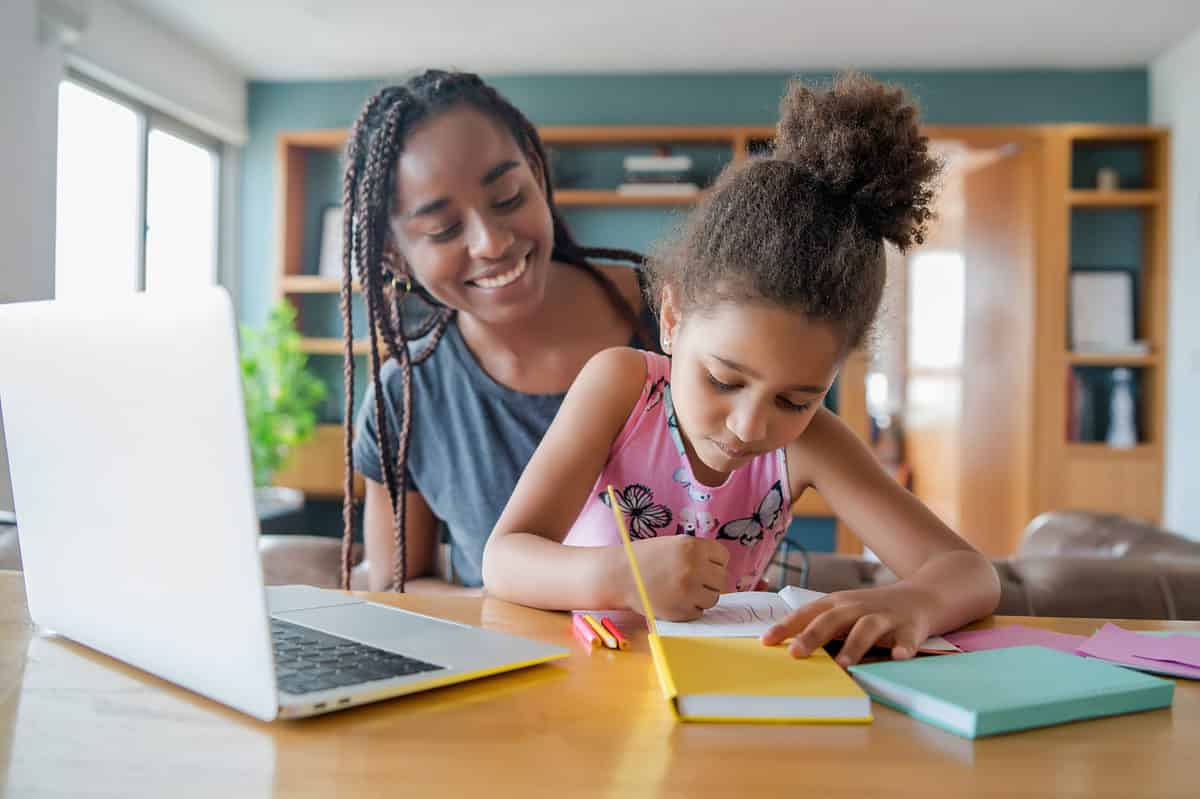
Homeschooling could be right for your kid if they need individual attention and extra support.
©Mix Tape/Shutterstock.com
If your child is more reserved and doesn’t want the stimulation of a big classroom setting, then Dr. Fraley recommends homeschooling as a viable option. This is also a great option for a child who needs extra love and emotional support.
Keep in mind, different schooling options might be better for different kids in the same family. “I homeschooled a third grader who loved it for the freedom it gave her to read at her own level, delving into chapter books meant for far more advanced children,” Spira-Bauer recalls. “But her sibling found success in a busy public classroom — energized by huge group projects — and taught us that sometimes, even within one family, different approaches can work for different kids.”
Interview Teachers, Currently Enrolled Parents, & School Leaders
Nobody knows what the school is like better than the people who work there or send their kids there — so utilize them! “It’s less about perfect fit than compatibility,” says Spira-Bauer. “Does a school’s philosophy align with your family’s, and does it encourage your child’s sense of wonder?” She suggests talking to currently enrolled parents, attending informational sessions, and inviting your child to participate in visits if possible.

Talk to people in the know when you are considering a school for your kids.
©Ushuaia studio/Shutterstock.com
“One family I knew took a more deliberate, methodical approach: they grilled school leaders about how they respond to curiosity, boredom, and even misbehavior, and they observed how teachers interacted with kids in real-life situations,” Spira-Bauer says. “That deeper exploration gave them confidence in the choice and clarity about what they valued in an educational community.”
And remember that while perfect doesn’t exist, you can find something that is perfect for you.
Signs That You Chose Well
If you pick the right school for your child, there will be signs. Spira-Bauer says, “Look for signs of growth, excitement for burgeoning ideas, and sustained engagement with their people or learning materials.”
On the other hand, there will also be signs your child doesn’t like their school. “If you find your child is dreading school, exhibiting a sustained slide in academic progress or showing signs of serious emotional stress, then consider asking questions that go deeper—talking to teachers, observing a class if you can, and connecting with other students or parents,” Spira-Bauer suggests.

Does your child seem happy after school? This might be a sign that you made the right choice.
©Ground Picture/Shutterstock.com
You can also tell how they're adapting by paying attention to their grades and feedback from teachers–but just because schoolwork is hard doesn’t mean it’s bad. They might just not be used to the challenge.
“School should stretch them enough to promote growth without causing overwhelm. If the curriculum is too easy and your child is constantly bored, it may be time to ask how well the school is meeting their learning needs. Conversely, if your child is avoiding school or shutting down, that signals that the environment might not be right.”
“The key is finding a balanced middle ground—one where challenges foster growth, yet don’t lead to excessive stress,” White continues. “Growth often stems from overcoming struggles, but those struggles should be constructive.
What to Do Before Switching Schools
If you suspect your kid isn’t doing well at their current school, our experts recommend taking time to evaluate the situation and see if you should switch.
“This might include meeting with administration, consulting teachers, and exploring alternative solutions,” White says. “Switching schools too readily can deny your child the opportunity to develop essential problem-solving skills and may create larger learning gaps over time.”
She adds, “Only consider a change when you’ve exhausted other resources, demonstrating both your commitment to your child’s success and a proactive, solution-oriented approach.”
It's Never Too Early to Start Thinking About Education
Even if your child is years away from kindergarten, you can start thinking about what type of schooling is best for them. Lisa Larue is a Teacher Assistant at Educare Chicago, which is run by Start Early, a national nonprofit organization focused on providing equitable access to quality early learning for children living in under-resourced communities. She suggests that parents give themselves enough time to research and visit schools to determine the right fit.
“We encourage parents to start early,” Larue says. “Be sure to explore your options, schedule classroom visits, and talk with teachers to understand daily routines, which can give you a sense of whether a school is the right match.”
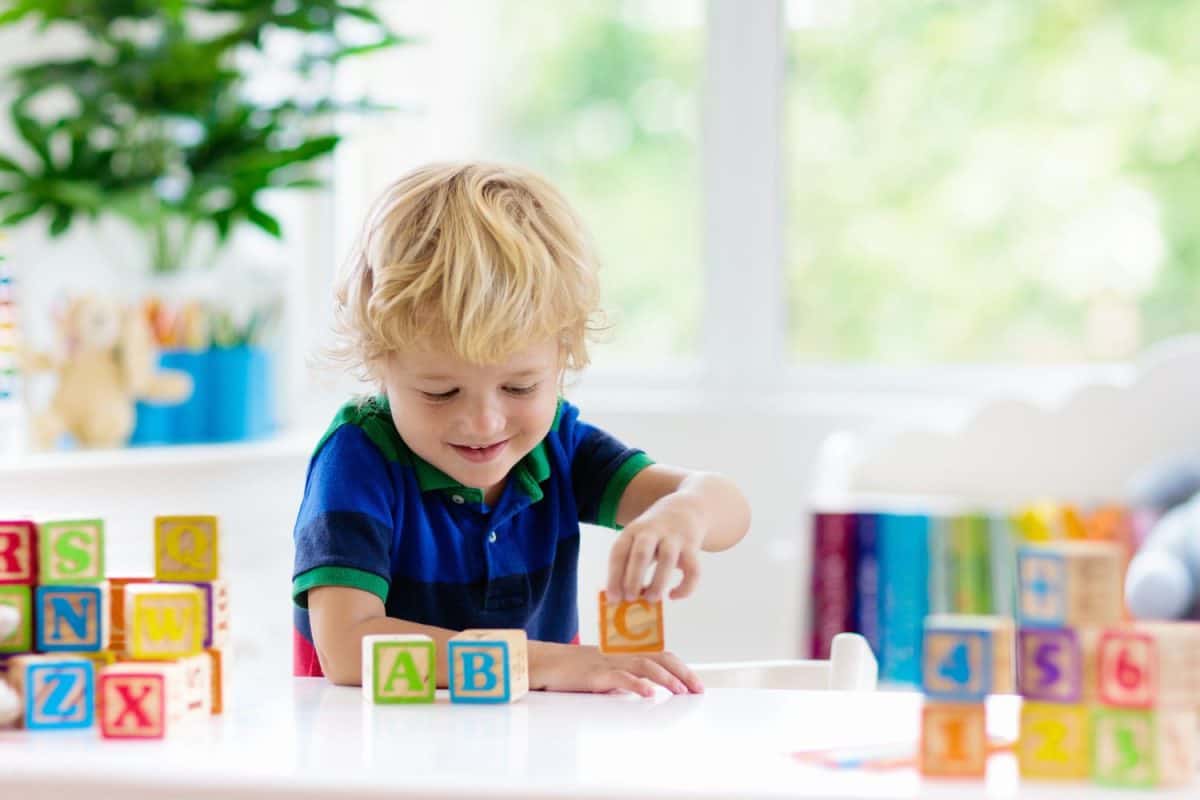
It's OK to start thinking about your child's educational future long before they start kindergarten.
©FamVeld/Shutterstock.com
And don’t get so caught up on the school’s academics that you miss out on other important factors that’ll clue you into how your kids will thrive at the school. “When considering different programs, look beyond just academics,” Larue recommends. “The learning environment, the teaching approach, and how the school supports social-emotional development are all important factors.”
Bottom Line: It Is Possible to Find What Works for Your Child
“Remember, the best educational setting is one that aligns with your child’s personality, learning style, and your family’s values,” White says. “It’s important to consider how each environment can support your child’s growth, challenge them appropriately, and provide the right balance of structure and creativity. The key is to understand that there is no perfect school—only the best option for your child.”
We couldn’t agree more.
The image featured at the top of this post is ©ANNA GRANT/Shutterstock.com
